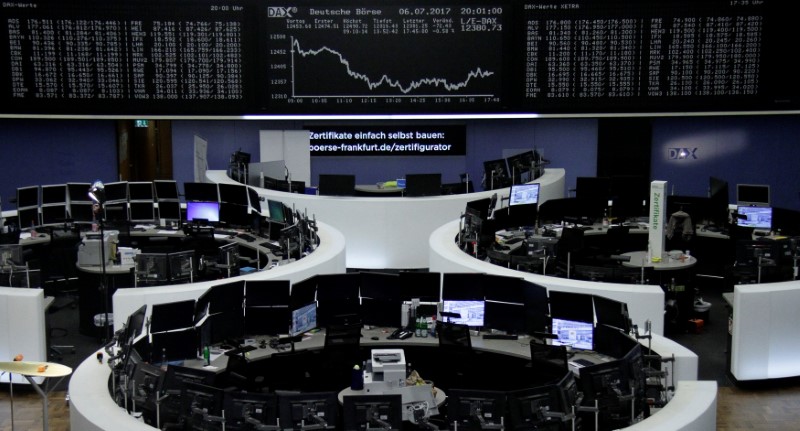By Vikram Subhedar
LONDON (Reuters) - World stocks are poised to end the week at six-week lows in the face of oil weakness, a spike in bond yields and expected tighter monetary policy especially in the United States.
U.S. job growth surged more than expected in June and employers increased hours for workers, signs of labor market strength that could keep the Federal Reserve on course for a third interest rate increase this year despite mild inflation.
However, stubbornly sluggish wage growth remains a concern for investors on worries over whether spending by U.S. consumers will be strong enough to back the U.S. Federal Reserve's intention to further tighten policy.
Bets that the world's major central banks are moving closer to unwinding ultra-loose monetary policies have roiled markets and European Central Bank minutes released on Wednesday indicate its policymakers are open to further steps.
This sent German government bond yields to 18-month highs, lifted the euro
European bonds steadied on Friday though some investors see more room for yields to rise. "Unwinding QE will be a key part of the normalization of rates policy," said Chris Iggo, CIO Fixed Income at AXA Investment Managers.
"The significant increase in government bond yields over the last week suggests that markets are starting to price this in. My guess is that it will have quite a bit further to go."
The ripple effects are being felt across asset classes.
"Bond yields rule," strategists at Morgan Stanley (NYSE:MS), led by Hans Redeker, said in a note to clients.
Bond markets are increasingly affecting FX and equity markets, the strategists said, drawing parallels with moves seen in 2013 during the so-called "taper tantrum," when Fed signals about withdrawing liquidity hit markets.
MSCI's gauge of global stocks (MIWO00000PUS) was at its lowest since late May's record highs and down 0.6 percent for the week. European shares (STOXX) fell 0.3 percent led lower by financials.
Stock futures on Wall Street (ESc1)
The dollar rose against a basket of major currencies (DXY) and hit a seven-week high against the yen after the Bank of Japan increased its government bond buying, expanding monetary policy when other central banks are moving toward tightening.
The BOJ said it would purchase an unlimited amount of bonds as it sought to put a lid on domestic interest rates pushed higher by the broad sell-off in developed market bonds.
In commodity markets, Brent crude futures (LCOc1), the international benchmark for oil prices, were trading down 1.2 percent, at $47.55 per barrel.
Oil prices are down more than 16 percent this year, muddying the outlook for inflation expectations globally.
Weakness in crude prices caused a drag on UK bluechips (FTSE), though a slide in sterling after disappointing economic data helped the exporter-heavy index outperform the region on the day.
Sterling slipped to the day's lows against the dollar, setting it up for its weakest weekly performance in a month, after industrial output data unexpectedly contracted in May, posing fresh challenges for the UK economy.

"Given the soft data this week, I think a UK rate hike is increasingly becoming a 2018 story," said Viraj Patel, an FX strategist at ING in London.